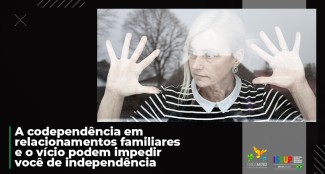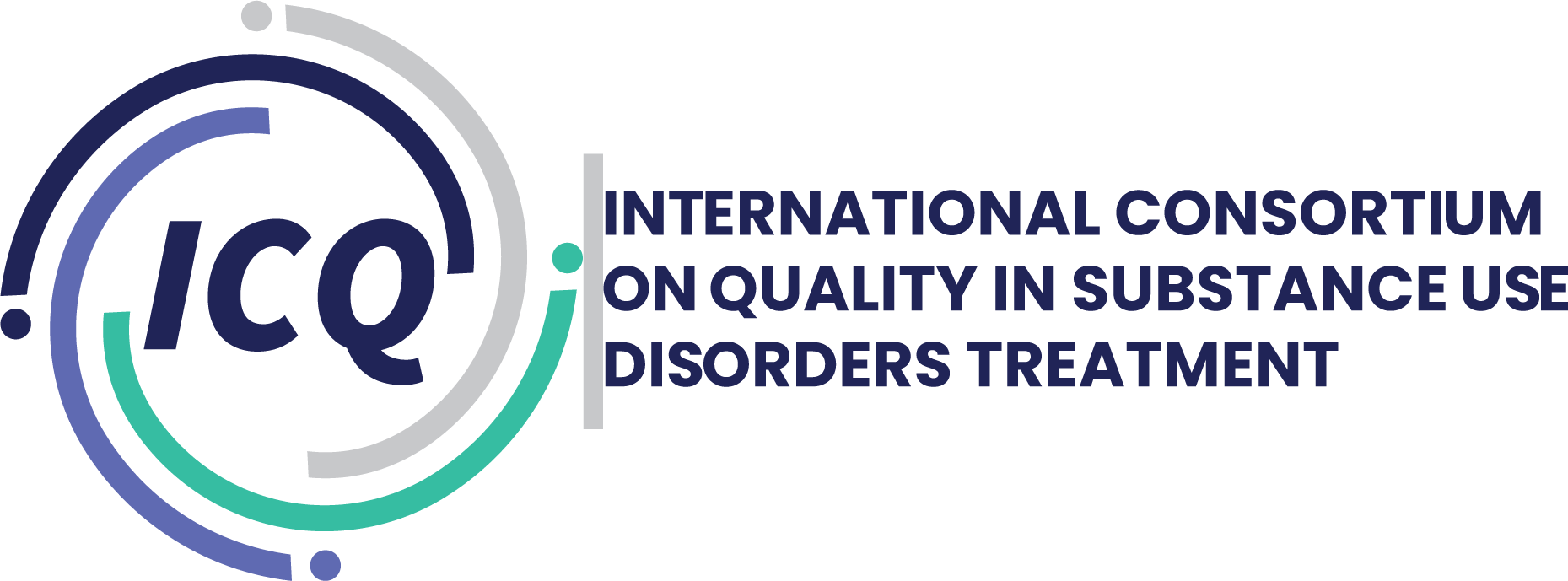Codependency can prevent you from being independent

Family members with substance use disorders can prevent others in the family from happily living their own lives.
When we first start protecting someone else's feelings, we often realize that we were trying to protect our own feelings.
Being emotionally connected to another person's ups and downs can take away the identity, integrity, happiness, and individuality we once had.
Family members who enable, or are codependent, achieve something with the behavior, otherwise they would not do it.
It can be helpful to ask yourself some questions: What are you getting from this codependent relationship? What do you need to do to protect someone else's feelings? What comfort is provided when your feelings become parallel to someone else's?
Recognizing Codependency
The impact of substance use on family relationships
A person who abuses alcohol or drugs does so with the highest form of selfishness. They often put their wants and needs before anyone or anything. Unfortunately, this can include mothers, fathers, brothers, husbands, wives, co-workers, and even children.

As the person allows their wants and needs to be the priority, some family members and others may begin to prioritize the need to comfort them.
As the abuser puts others second, the same people put them first. How does this happen?
Much of what we think can derive from our upbringing and family of origin. Much of how we behave has to do with our beliefs, experiences, how we were taught, and what we observed early in life.
In other words, codependency in a relationship that involves dependency runs much deeper and has been present for much longer than the current dilemma.
A codependent family member usually behaves in a way that allows the underlying needs to be met and to feel a purpose or being needed in the relationship.
There is a sense of fulfillment that a codependent receives by prioritizing someone else's needs over their own.
Codependent people often have difficulty finding purpose in their own life while finding comfort and purpose when they are present for others.
Codependent family members who are facilitating a drug abuser may hinder others who try to help.
Often, this is because those who suffer from codependency have a hard time asking for help while trying to provide help to everyone besides themselves. Some find it difficult to give up this role in the relationship.
A sad reality for some is realizing that the drug abuser was just using the codependency relationship to stay in a state of comfort and avoid responsibility and consequences.
One of the last things a person addicted to alcohol or other drugs wants is for the codependent person in their life to become independent.
Before getting help, the codependent may feel the need to be by the side of the drug abuser, and if it is not for their support, the person may get worse.
With effective education and counseling, the codependent person can realize that the substance abuser needs the codependent person more than the codependent person needs to enable their addiction and behaviors.
Codependency can be like setting yourself on fire to keep someone else warm
Codependent behavior is when one person seeks to meet the needs of another.
Codependency involving the addicted person's empowerment is often found with emotional satisfaction for one and one-sided emotional abuse delivered by the other.
Therefore, in relationships with someone with a substance use disorder, we know that they are receiving comfort and fewer consequences.
We know that the codependent is suffering emotional abuse and loss of identity and independence.
The question is, what is the codependent activator getting? What reward is so great for allowing this?
When we look at the behavior of a codependent person, this has a lot in common with those who have process addictions.
When a family seeks help for intervention and education for addiction issues at home, they frequently reference the intended patient's behaviors and substance abuse.
Couldn't one see the codependent person as the one who needs so much help, being equally addicted to the behaviors and needs of substance abusers?
Codependency is similar to a relationship addiction that is emotionally abusive and one side receives more benefits than the other.
Like all addictions, whether of process or substance, the reasons for them run much deeper than most can identify on the surface through self-awareness and self-correction. Professional help is almost always necessary.
One person's codependency and addiction can harm their entire family
Whether it's love, time, or attention, we have a lot of ourselves to give in a day. Offering most of yourself to one person can cause resentment and conflict with other members of your family.
Below are some helpful ways to recognize if your codependency is comforting an addiction and creating tension and anger in your family.
It is helpful to try to identify the reasons behind codependency.
Through intervention training and ongoing counseling, most realize that they are not codependent facilitators solely hoping to save their loved one; they were equally, if not more, seeking to satisfy a need for themselves.
As you read through the examples, try to recognize why you're doing it, not what you're doing.
You feel personally responsible for others
- You believe that if it weren't for your support, they would be worse off than they are (you're helping them).
- You think and feel responsible for other people.
- You feel anxiety, pity, and guilt when other people have a problem.
- You feel obligated to help the person solve the problem.
- You feel frustrated when your help isn't effective.
- You tend to anticipate other people's needs.
Your own needs are less important and not being met
- You try to please others instead of yourself.
- You wonder why others don't help the way you help them.
- You have fewer problems providing help and have difficulty asking for help.
- You find yourself saying yes when you want to say no, doing things you don't really want to do, doing more than your fair share at work, and doing things that other people are capable of doing for themselves.
- You don't know what you want and need, or if you do, you tell yourself that what you want and need isn't important.
- You find it easier to feel and express anger at the injustices done to other people than for the injustices done to you.
Your feelings of worth and contribution depend on others
- You feel safer when giving.
- You feel insecure and guilty when someone gives it to you.
- You feel sad because you spend your whole life giving to other people and no one gives to you.
- You are attracted to people in need.
- You find needy people attracted to you.
You're always at the mercy of someone else's drama or neediness
- You abandon your routine to respond or do something for someone else.
- You overcommit.
- You feel rushed and pressured.
- You feel bored, empty, and worthless if you don't have chaos, a crisis in your life, a problem to solve, or someone to help.
You feel powerless – even when you seem to be in control
- You deeply believe that other people are somehow responsible for you.
- You blame others for the situation you or your loved one are in.
- You believe that other people are driving you crazy.
- You feel angry, victimized, unappreciated, and used.
- You find that other people get impatient or angry with you because of all the previous traits.
Attention to one person's addiction affects many other relationships
Like addiction, codependency is not a moral flaw or the characteristics of a bad person.
Often, it is past or current traumas, life experiences, and learned behaviors that are the cause. It is almost never the current situation as the only cause of habilitation and codependency. As with addiction, it's helpful to identify the reasons behind the behavior and learn new coping strategies.
To help kick-start the process, it may be beneficial to understand some basic effects of relationships.
It can be said that when two or more people connect in a relationship in any form (work, romance, friendship, or family), those in the relationship will do one or more of three things:
- One person will take on some of the other's qualities.
- One person will take on a role that complements the qualities of the other.
- One person will take on a role that acts against the qualities of the other.
The most important thing to understand about the previous three statements is this: when two people connect or establish a relationship of any kind, both parties are changed as a result of that connection.
In other words, all parties have been altered to some degree as a result of being connected to and/or in a relationship with someone who has become dependent on drugs or alcohol.
To make this a little easier to understand, let's substitute a few words in the scenarios above to better suit the dependency situation:
- A family member will take on some of the behaviors that are harmful to the health of the drug abuser.
- A family member will take on a role that complements the abuser's unhealthy behaviors.
- A family member will take on a role that acts against the drug user's unhealthy behaviors.
Another helpful way to look at this is to replace the words "family member" with yourself and then replace "drug abuser" with the name of your addicted loved one.
Most people don't realize the depth of change that has occurred within them as a result of their relationship with someone addicted to drugs or alcohol.
Those affected may not see the impact this has had on other members of their families.
Often, as a result, there are misplaced emotions and resentments directed only at the substance user, rather than a family member who may be equally responsible for the ongoing circumstances.
Codependency from addiction can create a fear of change and abandonment of old behaviors.
Alcoholics and addicts are not the only ones who avoid intervention and treatment. Often, families avoid intervention and therapeutic confrontation.
The reasons behind their behaviors are wide-ranging, as are the various reasons why families claim "this will never work" or "they never will."
The main reason families are afraid is that they see the intervention more about what they will be giving up than what it will be providing for them and their loved one.
With any other medical problem that requires immediate or near-immediate remedy, families would not behave or react in the same way as they treat an addiction.
The fear is not in the change itself; Fear resides in the unknown that comes with change.
When a family acquires maladaptive coping skills over time, coping skills often become the new normal. The longer addiction is treated with these coping skills along with codependency and enabling behaviors, the harder it is to change the dynamic.
When families ask questions such as what is their success rate, what happens if they say no or make statements that they will never accept help, these questions are often motivated by fear.
The underlying fear is driven by misguided emotions that they might actually say yes.
The idea of a successful intervention can paralyze certain family members, depending on their role in the relationship. A person who accepts help and leaves for treatment can send a translated message to the family that they now need to do something different and change their behaviors.
A successful intervention means that there is no more hero, martyr and codependency. The caregiver function is now ensured by the intervention team and the treatment unit.
A codependent facilitator who is providing something to someone else in exchange for comfort for himself or herself may be threatened by an intervention and a successful outcome.
These behaviors and family thoughts do not make them bad people, but rather people who are in the grip of someone else's addiction and various family roles of behavior.
Family members who are emotionally attached and overwhelmed are rarely able to see that this is happening.
In fact, the mere suggestion of looking at it from this perspective may cause anger in some. Remember that anger is usually provoked by fear.
Our goal is to help families get on the porch to see this from another perspective. If this were any other medical condition outside of an addiction, family and others close to the addicted person probably wouldn't handle the situation in the same way.
Interventions provide a professional perspective
If you have avoided confronting your loved one with a professional intervention about their addiction and need for treatment, this may be the result of you protecting your own feelings and role in the family system.
When you look at all the problems, headaches, and consequences that drug and alcohol abuse brings to someone, you can often wonder why that person does it.
While the reasons why people abuse drugs and alcohol are endless, the question is, what does it offer that is so great that they would allow it to continue, even in the face of extreme consequences? After all, drugs and alcohol are providing them with something so powerful that they are willing to sacrifice anything and everything to get it.
Couldn't the same question be asked of families who allow the devastation to continue for much longer than they would allow other problems to continue?
What does the approach of allowing this to continue provide to those who play certain familiar roles, such as hero, martyr, and codependent facilitator?
What does codependency and empowerment provide to someone who is willing to allow chaos and confusion to continue and not seek professional intervention, counseling, or guidance?
If the current approach didn't provide something so necessary internally for them, such as the substances that users need, they wouldn't do it or try something different. It's not so much what you're doing, but why you're doing it or not.
Source: Family First Intervention
